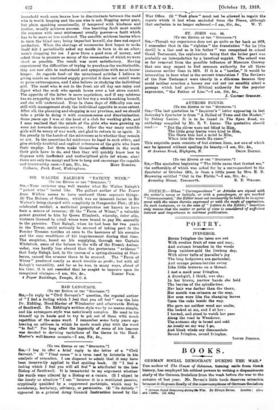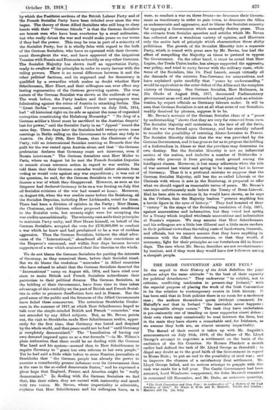BOOKS.
GERMAN SOCIAL DEMOCRACY DURING THE WAR.* Tan author of The House of &lessens, turning aside from Greek history, has employed his critical powers in writing a dispassionate study of the German, Socialists Sonia the week before the war to the autumn of last year. Mr. Bevan's little book deserves attention because it disposes finally of the miesonoeptione of German Socialism • German Said Democracy durievillies Wer. By Edwin Bevan. London : Atka and Unedn. 15s. nett by which the Paofficast, sections of the British Labour Party and of the French Socialist Party have been deluded ever since the war began. The theory of these Allied Socialists who still long to clasp hands with their " German friends " is that the German Socialists are honest men who have been overborne by a cruel militarism, but who really detest the war and would make peace on our terms if they had the power. This may be true in part of a minority of the Socialist Party, but it is wholly false with regard to the bulk of the German Socialists, who have co-operated with their Govern- ment throughout the war, and have approved of the iniquitous Treaties with Russia and Rumania as heartily as any other Germans. The Socialist Majority has shown itself an opportunist Party, ready to swallow all its principles in order to curry favour with the ruling powers. There is no moral difference between it and the other political factions, and its supposed zeal for democracy is qualified by a cowardice which makes us doubt whether Herr Scheidemenm, Herr Ebert, and their colleagues can ever effect any lasting regeneration of the German governing system. The true nature of the German Socialist was shown at the outbreak of war, The week before, the Party leaders and their newspapers were fulminating against the crime of Austria in attacking Serbia. The " Great Serbia " movement, said Vorwarts on July 25th, 1914, had " all historical right on its side as against the mass of organized corruption constituting the Habsburg Monarchy." " No drop of a German soldier's blood must be sacrificed to the Austrian despots' lust for power," said the Socialist Party in an " Appeal " issued the same day. Three days later the Socialists held twenty-seven mass meetings in Berlin calling on the Government to refuse any help to Austria. On July 29th, Herr Haase, then the Chairman of the Party, told an international Socialist meeting at Brussels that the guilt for the war rested upon Austria alone, and that " the German proletariat declares that Germany must not intervene, even if Russia intervenes." The German Socialists sent Herr Muller to Paris, where on August 1st he met the French Socialist Deputies to consult about common action in regard to war credits. He told them that their German comrades would either abstain from voting or would vote against any war expenditure_; it was out of the question, he said, for the German Socialists to vote money to finance a war of which they disapproved. However, as soon as the Emperor had declared Germany to be on a war footing on July 31st all Socialist oriticism of the war had ceased at home. Moreover, on August 4th, when the war credits came before the Reiohstag, all the Socialist Deputies, including Herr Liebknecht, voted for them. There had been a division of opinion in the Party ; Herr Haase, the Chairman, and thirteen others proposed to attach oonditions to the Socialist vote, but seventy-eight were for accepting the war credits unconditionally. The minority east aside their principles to maintain Party unity, and Herr Haase himself, on behalf of the German Sooialists, accepted the vote for £250,000,000 to conduot a war which he knew and had proclaimed to be a war of reckless aggression. Thus the German Socialists, hitherto the ohief advo- cates of the " International," abandoned all their convictions at the Emperor's command, and within four days became fervent supporters of a war which scattered their fine theories to the winds.
We do not blame the German Socialists for putting the interests of Germany, as they conceived them, before their Socialist oreed. But we do blame the credulous " comrades " in Allied countries who have refused to admit that the German Socialists deserted the " International " tramp on August 4th, 1914, and have tried ever since to make British and French Socialists subordinate their patriotism to their political dreams. The German Socialists, at the bidding of their Government, have from time to time taken advantage of this credulity on the part of British and French Social- ists in order to promote disaffection here and in France. But the good sense of the public and the firmness of the Allied Governments have foiled these manceuvres. The notorious Stockholm Confer- ence in the summer of 1917, at which Herr Soheidemann hoped to talk over the simple-minded British and French " comrades," was not attended by any Allied subjects. But, as Mr. Bevan points out, the visit to Stockholm made Herr Scheidemann realize, appar- ently for the first time, that Germany was hated and despised by the whole world, and that peace could not be had " until Germany is completely democratized." The " humiliation of having our own demand imposed upon us as a war-formula "—in Mr. Wilson's plain intimation that there could be no dealing with the German War Lord and his system—seemed then to Herr Soheidemann to require Germany to " grant her own reforms to her own people." Yet he had said a little while before to some Russian journalists at Stockholm that " the German people has already the power to exercise a considerably greater influence over its Government than is the case in the so-called democratic States," and he expressed a pious hope that England, France, and America might be " really democratized." In dealing with the German Socialists we find that, like their rulers, they are cursed with insincerity and speak with two voices. Mr. Bevan, whose impartiality is admirable, explains that Herr Scheidernann and his colleagues have, as it
were, to conduct a war on three fronts—to denounce their Govern- ment as reactionary in order to gain votes, to denounce the Allies as undemocratic and aggressive, and to blame the Socialist minority for opposing a Government which earnestly desires peace. Thus the extracts from Socialist speeches and artiolee which Mr. Bevan has collected show a wondrous variety of opinion, and illustrate only the entire lack of principle which characterizes those shifty politicians. The growth of the Socialist Minority into a separate Party, which is traced with great oars by Mr. Bevan, has had the effect of compelling the Majority at times to pretend to oppose the Government. On the other hand, it must be noted that Herr Legion, the Trade Union leader, has always supported the aggressive war policy, and tried to curry favour with the military caste, while some of the Socialists, like Dr. Paul Lensoh, accept virtually all the demands of the extreme Pan-Germans for annexations, and have explained quite candidly that " peace by understanding " would be equivalent to the utter defeat of the Allies and the complete victory of Germany. One German Socialist, Herr Heilmann, in Die Glocke of August 28th, 1917, denounced Parliamentary government as an evil, and commended instead just suoh an adminis- tration by expert officials as Germany labours under. It will be seen that German Socialism is not at all what some of our Socialists, readily deceived by phrases, suppose ft to be.
Mr. Bevan's account of the German Socialist ideas of a " peace by understanding " shows that they are very far removed from ours. The Sooialist Majority still maintains, in the face of all the facts, that the war was forced upon Germany, and has steadily refused to consider the possibility of restoring Alsace-Lorraine to France. The Socialist Minority thinks that the war was provoked by the German Government, and it has gone so far as to propose the holding of a Referendum in Alsace) so that the province may determine its own destiny. But the Socialist Minority is not an influential seotioa of the nation, and includes a number of Bolsheviks o cranks who prevent it from gaining much ground among the intelligent classes. Moreover, it lost many adherents when the tide of war seemed last winter and spring to be running fast in favour of Germany. Thus it is a profound mistake to suppose that the German Socialist Majority, still less the so-called Liberals or the Cierioals with whom it acts in the Reichstag, is prepared to offer what we should regard as reasonable terms of peace. Mr. Bevan's narrative unfortunately ends before the Treaty of Brest-Litovsk. Had he been able to continue it, he would have shown, as he says in the Preface, that the Majority leaders " present anything but a heroio figure in the eyes of history." They had boasted of their " victory " in the shape of the Reichstag resolution of July, 1917, against annexations and indemnities, but they voted last spring for a Treaty which implied wholesale annexations and indemnities at Russia's expense. We may assume that Herr Soheidemann and his colleagues are a little less illiberal and a little more modern in their political views than the ruling caste of landowners, Generals, and officials, but we cannot assume that they have anything in common with the Allied democracies, or that they would, if necessary, fight for their principles as our forefathers did in Stuart days. The men whom Mr. Bevan describes are not revolutionaries by instinct, and if they were they would have few followers among a sheepish people.



































 Previous page
Previous page